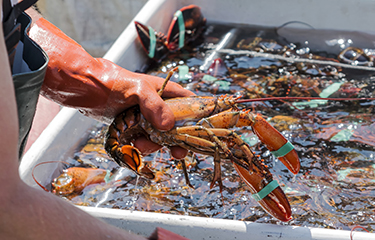The Gulf of Maine lobster fishery has temporarily withdrawn its effort to pursue recertification under the Marine Stewardship Council sustainability standard.
The Maine Certified Sustainable Lobster Association (MCSLA), an industry group that has served as the fishery’s client group for the MSC certification process since it was first certified in 2016, decided not to continue to seek recertification, after it lost its certificate in November 2022.
The suspension, which became effective 15 December, 2022, stems from a court ruling in July 2022 by U.S. District Judge James Boasberg determining the fishery is no longer in legal compliance with the U.S. Marine Mammal Protection Act and Endangered Species Act due to its overlap with known habitat for North Atlantic right whales.
Maine’s lobster fishery accounts for two-thirds of all U.S. lobster landings. MCSLA leaders John Whiteside and Craig Rief did not immediately respond to calls and emails from SeafoodSource requesting more information about the decision.
The Animal Welfare Institute, Defenders of Wildlife, and the Natural Resources Defense Council filed a formal objection to the proposed renewal of MCSLA’s certification in 2022, arguing the fishery continues pose a threat to right whales.
“The decision made by the fishery to withdraw from the MSC program is the right move for North Atlantic right whales and for seafood consumers, who deserve to be able to trust the ecolabels they rely on,” Natural Resources Defense Council Senior Scientists Francine Kershaw said in a press release. “We hope that the fishery now starts to take meaningful steps towards fishing using ropeless (or ‘on-demand’) fishing systems, which virtually eliminate entanglement risk and will allow us to once again enjoy Maine lobster without fear of harming one of our nation’s most treasured whale species.”
Third-party MSC assessor MRAG Americas performed an expedited audit of the fishery in September 2022, based on information from the court decision. The audit determined that due to the court ruling, the fishery is no longer in compliance with all relevant U.S. laws, and therefore “does not meet the MSC fisheries standard.”
Canada’s lobster fishery continues to hold MSC certification, as it is not subject to the same laws the Maine fishery has been found to be breaching.
“This move strengthens the integrity of the MSC program and will give consumers more confidence in purchasing products that do not further imperil critically endangered species,” Defenders of Wildlife Senior Attorney Jane Davenport said. “We encourage the American lobster fishery to move towards innovative gear technologies that avoid entanglements to move towards a future where right whales and a thriving lobster industry coexist.”
Animal Welfare Institute Marine Wildlife Consultant Kate O’Connell criticized the MSC has having lax standards in a SeafoodSource interview in April 2022, and said she is hopeful that ropeless fishing gear might be a solution for the fishery. Her organization is a part of Make Stewardship Count, which has advocated for the Marine Stewardship Council make its fisheries standard and certification process more stringent in its environmental protections.
“North Atlantic right whales are at a critical tipping point, and the MSC blue tick label should not be awarded to any fishery that has the potential to push the species closer to extinction,” O’Connell said. “Consumers deserve to have confidence in products that were supposedly vetted as ‘sustainable’ by the leading seafood certifier in the world.”
Photo courtesy of WoodysPhotos/Shutterstock







